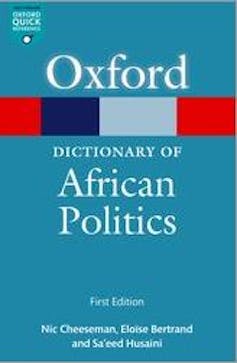Every country has its own political language. These terms and phrases that have developed over time give distinctive meanings that may not be fully understood by outsiders. Unless we learn them, we may miss critical information about how politics really works.
Our new dictionary of African politics reveals the witty and insightful political terminology that people in different African countries use to speak truth to power and discuss everyday developments. It shows the importance of language for understanding politics and the varied experience of different nations.
The dictionary serves three key purposes. First, it provides clear and concise overviews of hundreds of key personalities, events and institutions from the colonial period to the present day. These range from Sudanese President Omar al-Bashir to former South African leader Jacob Zuma, through the late Kenyan environmentalist and Nobel Laureate Wangari Mathaai, and Aja Fatoumata Jallow-Tambajang, a leading gender activist and the vice president of Gambia.
Second, it explains a rich set of theoretical terms that emerged out of the research on Africa over the last 70 years. These include neo-patrimonialism and extraversion, which have become important for global debates about power and the way it’s exercised.
Third – and much more significantly – it allows for a better understanding of the contributions that the continent has made to the practice and understanding of everyday politics. It also makes it possible to share the perceptive and shrewd ways that people speak truth to power in various countries: this is the real reason that the world needs a new dictionary of African politics.
Crowd-sourcing
To access this wealth of “kona” knowledge (street corner wisdom in Kiswahili), we crowd sourced suggestions for the most relevant and insightful terms using social media. The hundreds of responses we received mean that the dictionary is packed full of fascinating terms from across the continent. These come from a variety of languages including Kiswahili, Chibemba, Kikuyu, Wolof, isiZulu and isiXhosa. There are also Africanised versions of English, French and Portuguese words.
An illustrative example is the wealth of English vocabulary that has emerged from the interaction between local political norms and democratic institutions. This includes the Kenyan model of “negotiated democracy” – the sharing of political positions between different communities in advance of an election to avoid conflict.
Another is the Nigerian practice of “zoning”, which was set up to try and ensure that the presidency of Africa’s most populous country alternates between northerners and southerners. That way, no community is permanently excluded from power.
Clothing-related expressions have also emerged in countries like Kenya and Ghana to show voting behaviours. “Three-piece suit voting” refers to supporting the same party for all elected positions. On the contrary, “skirt-and-blouse voting” means to vote for different parties for presidential and legislative elections.

A series of evocative expressions describe a politician’s move from one party to another – usually from the opposition to the governing party following an inducement. Terms such as floor-crossing or cross-carpeting are inspired by the parliament’s settings, or nomadic traditions – examples are transhumance and “nomadisme politique”.
Read more on The Conversation
